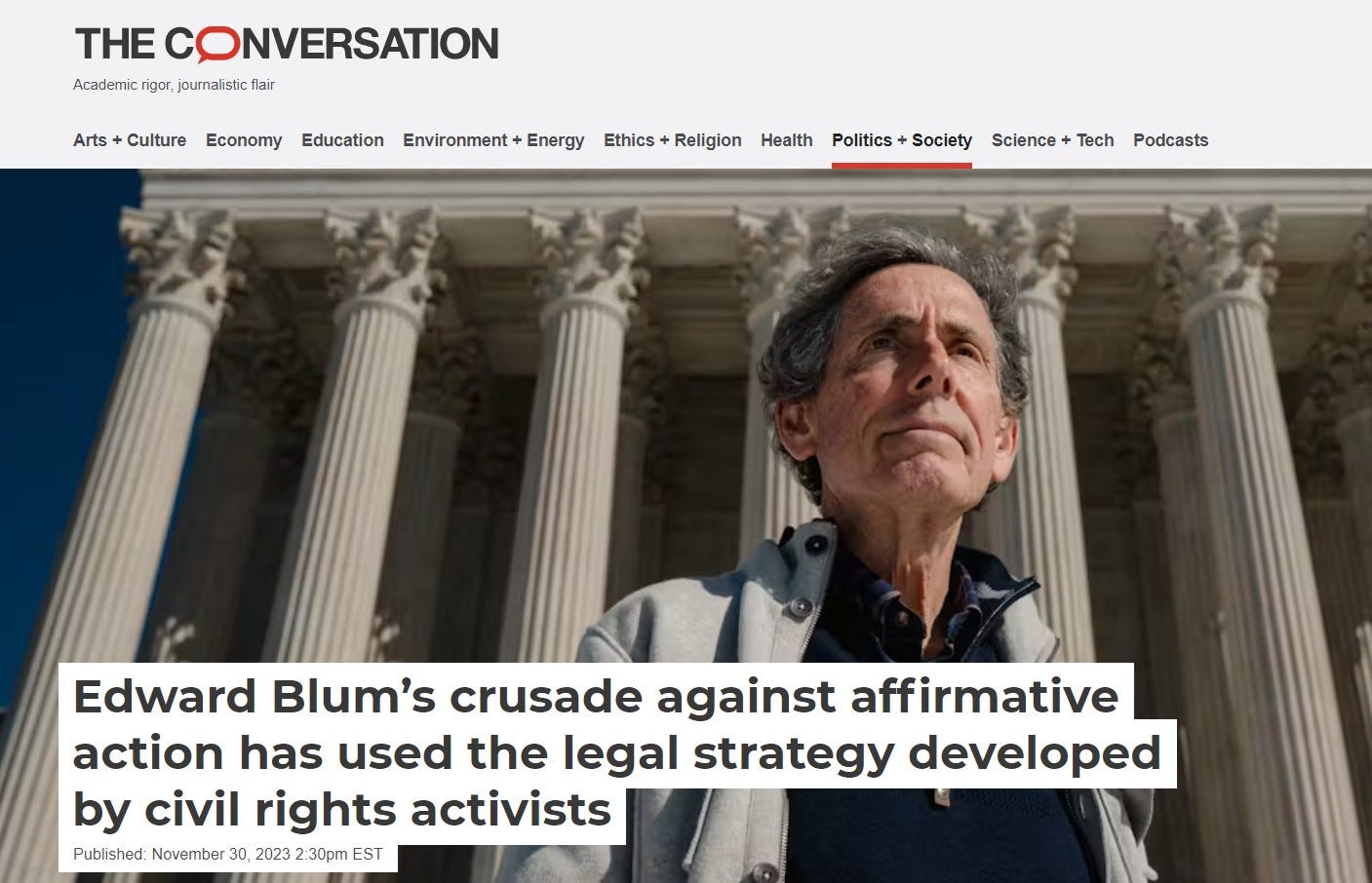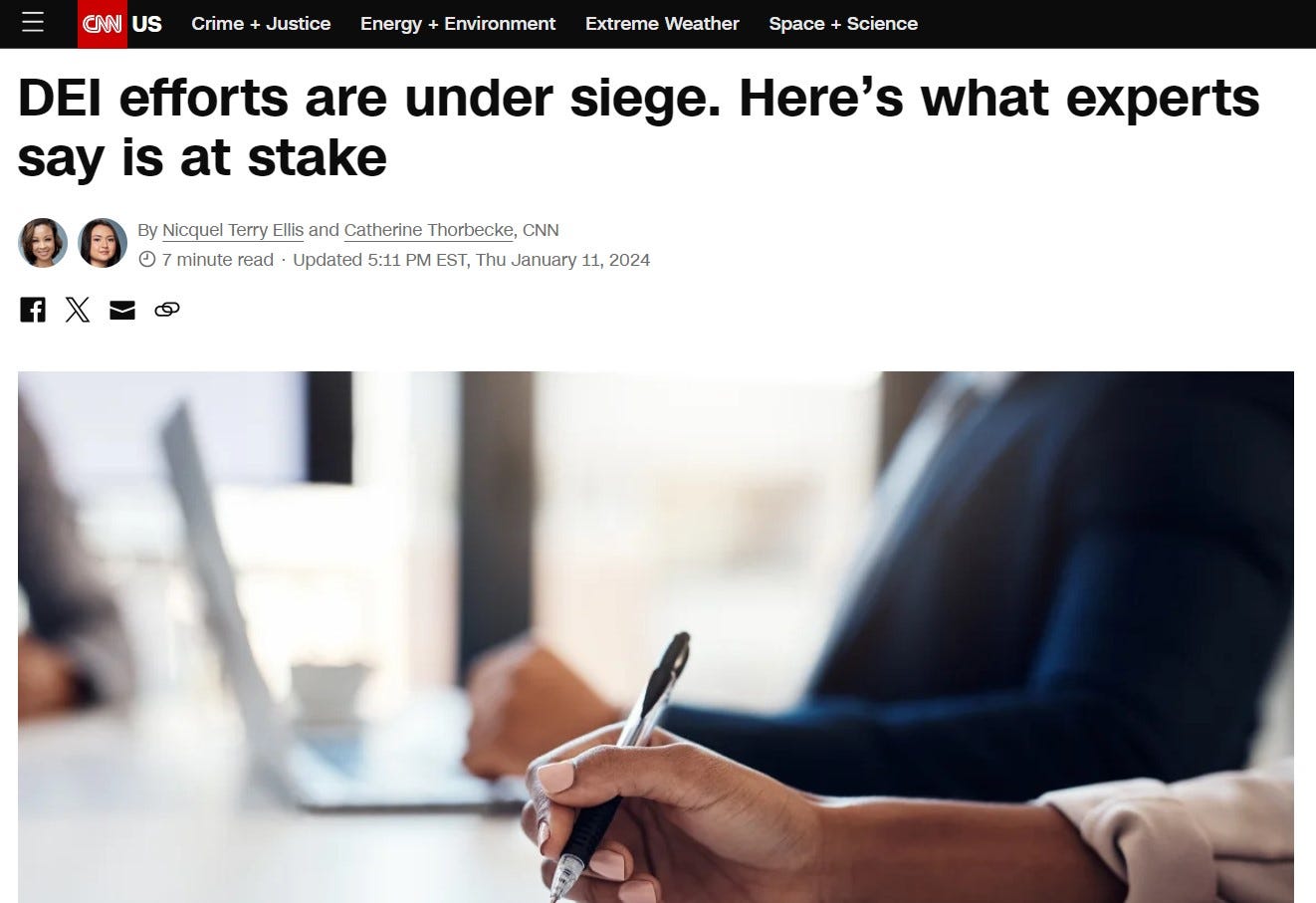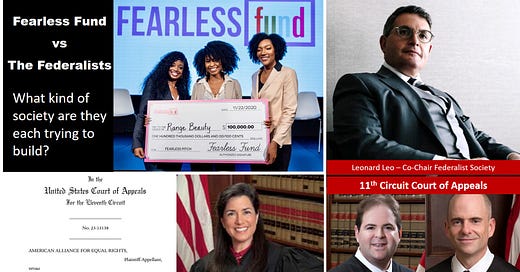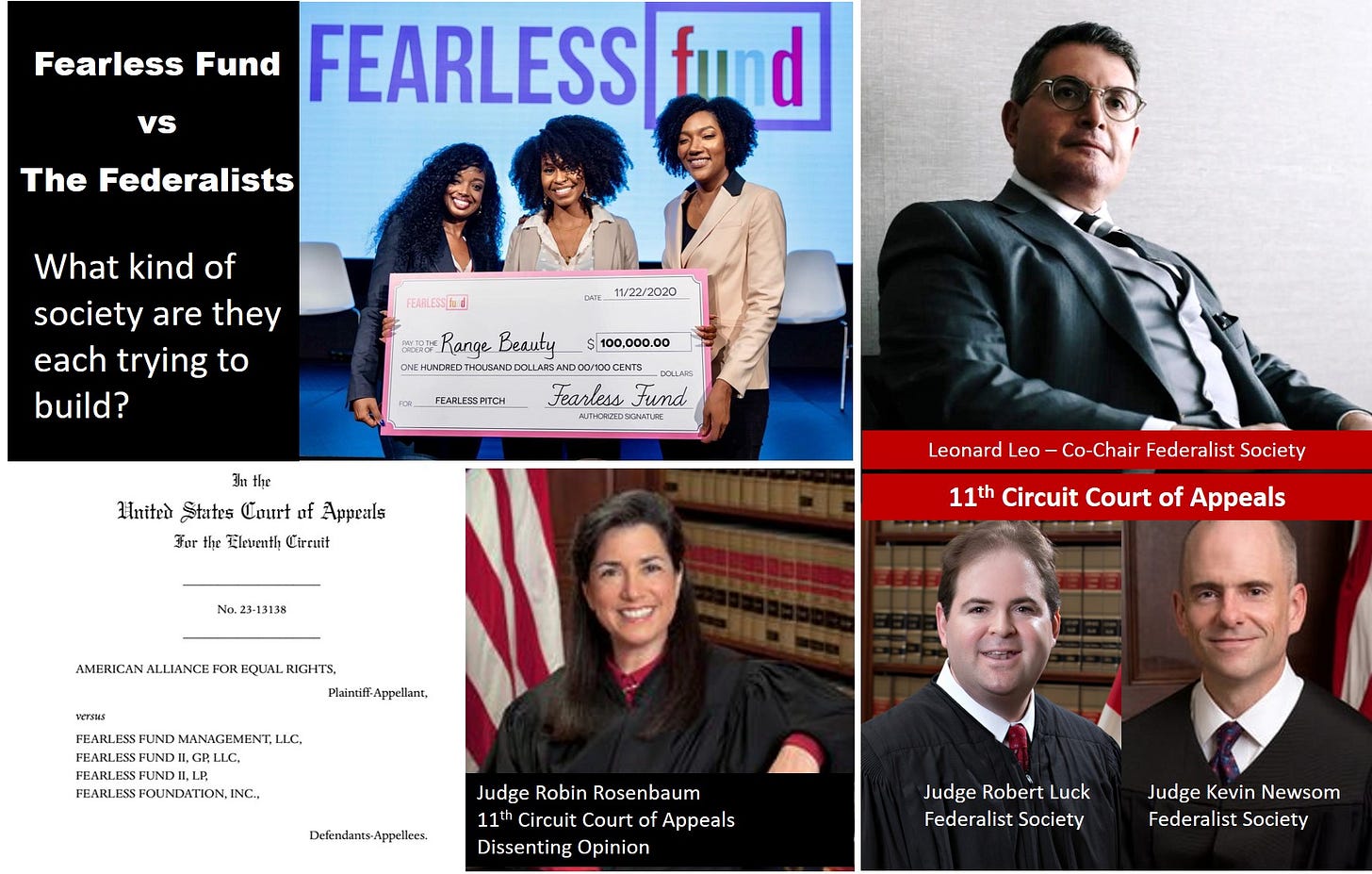CGC Journal - June 2024
We're Building a Co-learning Community of Empathetic Societal Change Agents
JUNE 2024 | ISSUE 11
FEARLESS FUND AND THE FEDERALISTS
TABLE OF CONTENTS:
Current Events - News with historical context
Fearless Fund and The Federalists
Emily’s Corner - Emily’s reflections and insights
Listening Well
Talking With Kids -
What is America?
Celebrating Change Agents -
Fearless Fund Founders
Conversation Starter -
Where have you found exploration and inquiry with another group?
Recommended Resources -
The Hidden Wound, by Wendall Berry
Community Corner -
We want to hear from you. We invite our community of co-learners to share with us what they are witnessing and experiencing in society where they live, work and play.
NOTE: For full access to the CGC Journal, please select one of the paid subscription options. Paid subscribers become part of our growing community of empathetic societal change agents who help support the mission of CGC and the continued expansion of our work. We appreciate you!
FEARLESS FUND AND THE FEDERALISTS
On June 4, 2024 the 11th Circuit Court of Appeals rendered a ruling that shocked Black America. In a 2-1 ruling handed down by a three-judge panel, the American Alliance for Equal Rights was granted a victory in an apparent disingenuous lawsuit against the Fearless Fund, an investment fund founded by three Black women as a drop of vital water in an economic desert for minority women entrepreneurs.
The two White male judges based their opinion on the basis that the “Fearless Striver’s Grant Contest,” which the Fearless Fund introduced to provide four grants of $20,000 to four Black women founders selected by the contest, was in violation of U.S. Code 42, 1981 which is derived from the first Civil Rights Act of 1866.
FEDERALIST JUDGES
Both of the judges that ruled against the Fearless Fund are members of the Federalist Society, a self-proclaimed “group of conservatives and libertarians dedicated to reforming the current legal order.” It is led by Leonard Leo, whose active leadership helped to shape the current conservative construct of the Supreme Court and numerous other courts across the nation.
The lone dissenting judge is a woman. She decried the American Alliance’s claim of injury to its members akin to a sports athlete “flopping on the field” to sway the referee.
GOOD INTENTIONS
The Fearless Fund seemed like a good idea. Just before the global pandemic year of 2020, a trio of young Black women put together a pool of funds to invest in the innovative entrepreneurial talents of women of color. Their intent was to provide a new resource of funding (financial bootstraps) to help Black and other women of color get their business ventures off the ground, to grow and scale and become employers. The new employers could contribute to local and regional economies and become another source of employment while bolstering their region’s GDP and economic competitiveness (presumably goals that White conservative American men would support).
It seemed like a good idea. For categories of women who historically have lacked generational wealth and had no “friends and family” round that traditionally served as startup risk capital, the new Fearless Fund would be a much-needed resource in a nascent fledgling investment infrastructure for women of color. And it worked.
FEARLESS FUND FOUNDERS
Founded in 2019 by Arian Simone, Keshia Knight Pulliam, and Ayana Parsons, the Fearless Fund invested in pre-seed and follow-on rounds of funding for women of color founders building scalable enterprises. According to People of Color in Tech (POCIT):
The Fearless Fund portfolio includes Bitsy’s, the clean food and beverage brand co-founded by Gabrielle Union, Melissa Butler’s cruelty-free beauty brand The Lip Bar, Pinky Cole’s Slutty Vegan, and Sevetri Wilson’s Resilia.
Bank of America, Costco and Mastercard also thought the Fearless Fund was a great idea. They provided follow-on investments to bolster the Fearless Fund’s portfolio. But in the summer of 2023, the upward trajectory hit a stumbling block. It was the third annual Fearless Fund’s Striver’s Contest. A June 26 article of POCIT reads:
As well as financially investing in Fearless Fund, Mastercard will host the third annual Fearless Strivers Grant Contest which sees Black women-owned small businesses awarded $20,000 grants, Mastercard Digital Doors tools, and valuable mentorship opportunities.
BLUM, LEO & PROJECT 2025
Then, the Fearless Fund got sued by presumed proponents of entrepreneurship, investing and business growth. The tandem of Blum and Leo represent a formidable team supported by an army of conservatives organized around a 900+ plan called Project 2025. The assaults against Affirmative Action, DEI and Black women in particular appear to warn of a pending future.

Apparently, there wasn’t anything particularly interesting about the first two Fearless Fund contests, but the third one attracted a few phantom newcomers. Three anonymous White women, represented by Ed Blum of the American Alliance for Equal Rights, claimed to have desired to enter the contest but could not because it was only open to Black women entrepreneurs.
Blum is the infamous architect of using legal strategies of 20th century Civil Rights attorneys to reverse Affirmative Action laws and policies in the 21st century.
Blum’s American Alliance sued Fearless the day after applications opened for the fourth entry period, according to the Court ruling. A lower district court had ruled the Alliance had standing to sue but would not provide the injunction requested, which would’ve prevented Fearless from closing the contest and awarding the grants. The district court did not believe the Alliance could demonstrate injury to its members … who did not even apply for the contest.
SHORT CIRCUITING BLACK PROGRESS
The Federalist judges on the 11th Circuit Court of Appeals disagreed with the lower court. Although the judges never heard from any of the presumed aggrieved American Alliance members, they ruled in favor of Ed Blum who represented them. He explained that he had spoken to the three members, which were only known by the pseudonyms Owners A, B and C.
Only Blum presumably knew who the phantom plaintiffs were. He justified their anonymity under the guise of fear of hostile acts, which also concealed their business identity and other key factors necessary to determine whether they were even eligible for the contest, aside from the racial category.
Regarding presumed injury, the Federalist judges wrote:
“…contrary to the district court’s determination, in the absence of a preliminary injunction, the Alliance’s members would suffer irreparable injury. Moreover, and more specifically, each lost opportunity to enter Fearless’s contest works an irreparable injury because it prevents the Alliance’s members from competing at all—not just for the $20,000 cash prize but also for Fearless’s ongoing mentorship and the ensuing business opportunities that a contest victory might provide.”
The dissenting judge acknowledged that Black women in the business world are grossly underrepresented as business owners. She also acknowledged the obvious disingenuousness of the Alliance’s claim. She wrote:
“…as American Alliance has portrayed its members’ alleged injuries, it has shown nothing more than flopping on the field. Although three of American Alliance’s members pay lip service to the idea they are “ready and able” to participate in Fearless’s Contest, their declarations show, in context, that none has a genuine interest in actually entering the Contest.
Indeed, not one has established that she is, in fact, able and ready to enter the Contest and would do so in the upcoming period if the Contest were open to non-Black women. So American Alliance’s alleged injuries don’t show “a real controversy with real impact on real persons” among its membership.”
In the greater context of an all-out national assault on DEI and Black women, in particular by coordinated, networked and mobilized organizations led by White conservative men, the lawsuit brought by Ed Blum and supported by Federalist judges amplify the historic multigenerational screams of Black women that have been largely ignored by a majority of White America.

CIVIL RIGHTS JIU JITSU
Ironically, the lethal legal maneuver used by Blum and the Federalist judges to beat down the fledgling efforts of Black women to help other Black women is the 1866 Civil Rights Act. This law was introduced specifically to empower Black people; it formed the framework for the 14th amendment which transformed Black people into Black American citizens in 1868.
In an apparent mockery of the conditions of Black women, Blum appropriated the legal power of the first Civil Rights Act, created for a population of Black people emerging from generations of extraordinary trauma (including three generations of systemic rape culture endured by Black women) to ruthlessly beat down the honorable efforts of the Fearless Fund.
A majority of White America witnessed the unprecedented trauma inflicted upon Black women for generations … and stood by silent and complicit.
OUR AMERICAN INHERITANCE
After emerging from an era of enslavement and becoming U.S. citizens, over the course of the next century … from 1868 when Black people became Black American citizens to 1968, when the voice of a Black King that the majority of White America despised was silenced … Black women continued to endure systemic violence targeting them, their families, and children. White men bombed their homes and their churches.
The fathers, husbands and sons of Black women were humiliated, hunted for sport, imprisoned, kidnapped, tortured, mutilated, and murdered by the tens of thousands. The government and private sector were co-conspirators in denying Black Americans equitable access to the American Dream of prosperity while systematically destroying the wealth they did create. Meanwhile, the majority of White America stood by … silent and complicit.
We all inherited the conditions of that hostile 20th century segregationist society. We didn’t create those conditions. We inherited them. No shame. No blame.
But we also inherited a responsibility for the conditions of society we will pass to future generations. Blum, Leo and others like them envision a future America much different than the one envisioned by Black women. Both are working hard to build the America they want.
Which America are you working to build?
We need your support to do this work of providing perspectives on racial dynamics in society today through an informed lens of historical insight. Please consider joining our growing community of co-learners and help support the work of Common Ground Conversations. Subscribe to the CGC Journal. Share with your friends, family and networks.








